Erstellt am: 21. 1. 2017 - 10:09 Uhr
Living with Polar Bears (and whales)
FM4 Reality Check Special
Listen to a Reality Check Special with Johnny Bliss visiting the arctic northern Canadian community of Churchill.
Saturday, January 21st, 12-13, and afterwards seven days on demand.
If you miss the program, you can still stream it via the Reality Check podcast or at fm4.ORF.at/7tage.
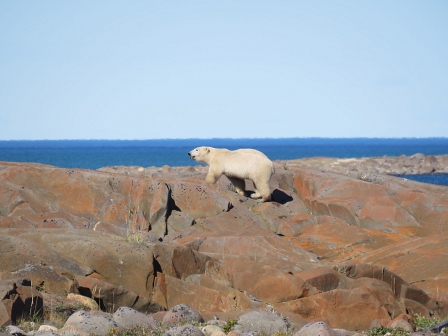
Johnny Bliss
If you're not from Canada, you've probably never heard of the small community of Churchill, MB. It's a small town populated by 800 or so people (and well over 1000 polar bears), up so far north that there are no major roads leading up to it... travellers hoping to visit either have to take a very slow train (48 hours of travel from the provincial capital, Winnipeg) or charter an expensive flight. The main tourist attraction is, of course, the ever-present polar bear, who you can get up close and personal with from within a well-armoured specialized tundra vehicle. At least, that's what you can do, if you decide to visit Churchill on-season.
Alternatively, you can do absolutely no research as to what time of year is best to visit, simply fly to Winnipeg, and figure it out from there. That was the strategy I employed, and while I cannot recommend it, I do have to admit that it did ultimately work for me... more or less.
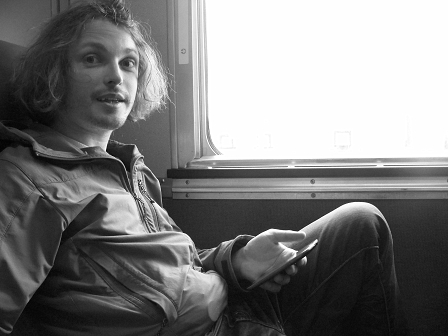
Kristaps John Balodis, the third
As a Canadian, I've often heard references to Churchill spoken in a sort of hushed, respectful tone by people who hadn't actually ever been there. I guess a visit is one of the "great Canadian adventures" that we like to romanticize and imagine our future-selves going on.
Perhaps the reason I'd never heard anyone who'd been to Churchill talking about it, was because going there in real life somehow de-mystified the actual experience, made it real and less magical?
There was only one way to find out.
Canada by Rail
Canada's national passenger rail service:
www.viarail.ca
I've produced two other programs about my travels on Canadian rail:
Canada by Rail, Part 1
Canada by Rail, Part 2
Special thanks to my imprompto travel partner, Kristaps, and the lovely people at Via Rail without whom this feature surely would not exist...
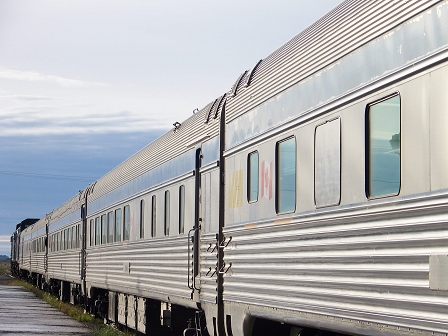
Kristaps John Balodis, the third
Part One: Taking the Train
* - oh yeah, the beluga whales! I totally forgot to mention them before. OK, so during on-season there are something like 50,000 beluga whales in the bay... no, no, forget it, I'll tell you later (see below).
Before I found out that early September was the only time of year that there were no tundra vehicle tours, no beluga whale* cruises, and the likelihood there'd be few northern lights visible, I'd booked myself an expensive flight to Winnipeg, followed by a roundtrip train ticket to and from Churchill.
In short, by the time I started contacting companies to ask about tours they weren't going to be doing, it was too late to really get out of it. By the time I'd boarded the train and started my slow journey north from the prairies to the tundra, I had resigned myself to spending the week just enjoying a comfortable couple days of relaxing rail travel, followed by a few days of eating and sleeping in a quiet town, and then returning the same way.
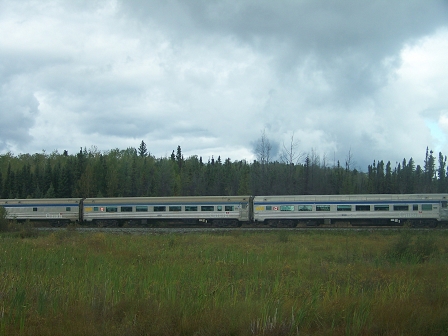
Kristaps John Balodis, the third
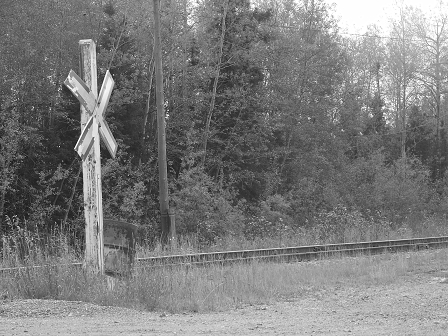
Kristaps John Balodis, the third
My first clue that this expectation might turn out to be overly-pessimistic came on the train itself, in the form of Kristaps, a young mathematician and photographer from Winnipeg who also happened to be the only other traveller in the entire train car with me. It was his first trip over to Churchill (in fact, it was his first trip on a train ever, period) and the way he described it to me, he'd made the decision to go impulsively, a bit like I did, but with less ridiculous distance travelled and money burnt.
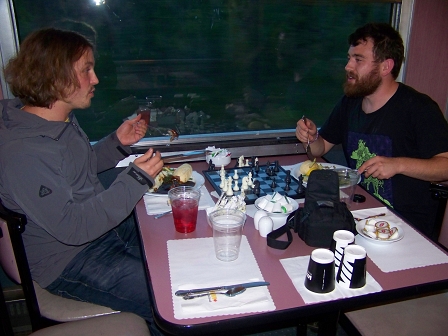
Kristaps John Balodis, the third
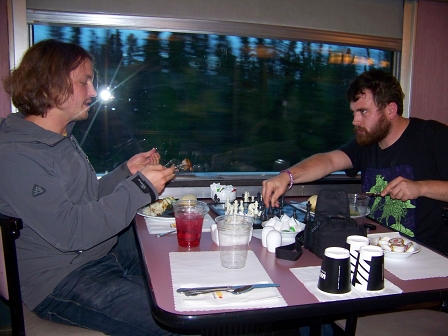
Kristaps John Balodis, the third
We became fast friends in the way travellers often do... especially when there's literally no one else on the train to talk to, except rail employees! and we spent a lot of time discussing ways to spend our days in Churchill. He seemed pretty surprised when I told him that all the tourist activities were officially off during our stay, but we agreed that whatever happened, we'd make the best of it. Me being a radio travel journalist, toward the end of the train ride, I asked him if I could get him to share his thoughts and reflections on the journey, something he was more than happy to oblige.
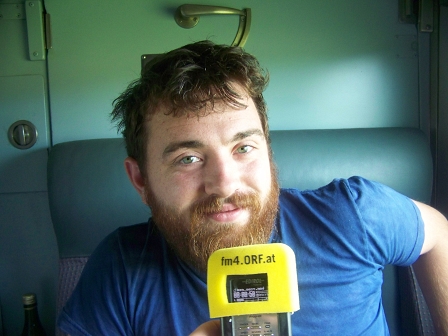
Johnny Bliss
At the beginning of the trip, it’s large, wide open flatlands, big open skies. As you get a bit farther north, you start to see a lot more tree density, until you get close to the tundra, and there the trees start to shrink, and become skinnier and shorter because it’s a much harsher climate to survive there.
Have you seen any wildlife?
I haven’t! But the train is a bit noisy, so animals could be frightened off.
48 hours of train travel is a lot. How do you cope?
For myself, it’s pretty easy to fill up time sitting on a train, as I’m very interested in mathematics. The great thing about math is that all you need is a pen and piece of paper, and a little bit of imagination. You’ll never be bored, wherever you are! I really like the viewpoint that the Hungarian mathematician Paul Halmos had. He saw math much like being a painter. You think math, oh it’s all logical rules and very dry… but the truth is, discovering modern mathematics actually takes fifty percent creativity, and fifty percent logical rigour. And this is something most people don’t get to realize, because math isn’t taught as a creative art, so… Oh!
At that moment, we'd just seen several deer running across the prairie.
So I have to take back what I said earlier about not seeing wildlife!
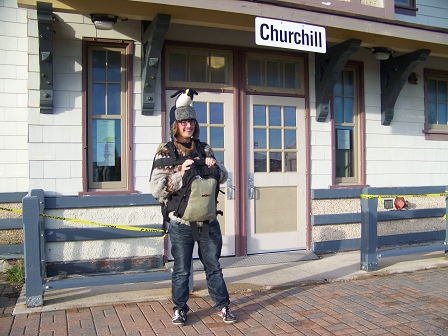
Kristaps John Balodis, the third
Part Two: Hundreds (or even thousands) of beluga whales
As it turned out, reports of there being no whale-watching tours left running, nor any beluga whales left to see (because of seasonal migration) even if there were... were inaccurate. It's funny how much of a difference coming in person makes to simply speaking to someone on the phone!
So, as far as the tour was concerned, as soon as it became clear that there multiple people in Churchill who were interested in taking a tour, a tour became possible. Shortly after disembarking from the train, Kristaps and I'd met a French couple who were staying in a hotel next to ours, who were also interested in seeing beluga whales. Then in the hotel lobby, we met two hydro employees who were there on business, but also wanted to do some sight-seeing. With this newfound entourage of friendly money-carrying outsiders in tow, I marched into the office of a company who had rejected me earlier, and suddenly: voila! There was a tour.
And: there were still beluga whales hanging out in the bay, after all. Okay, perhaps not the tens of thousands that you supposedly would see just a few weeks before, but there were still at least hundreds of them swimming and jumping and playing around in the water, to the point that if you looked in any direction at any given moment, you were more likely than not to see them, spooky bone-white shapes breaching the waters for air.
KRISTAPS: If you look out onto the water, [you see] thousands of whitecaps, until you realize that’s not a whitecap: it’s actually a whale, peeking up out of the water! We were actually able to get up close and personal with some of them. They were everywhere, and it was the off-season, so I can’t imagine what the on-season would look like.
In the interests of being able to imagine what the on-season would be like, after the tour, I approached Dwight Allen, who was the owner of the tour company (Sea North) who'd taken us out. I asked him a few questions about the beluga whales.
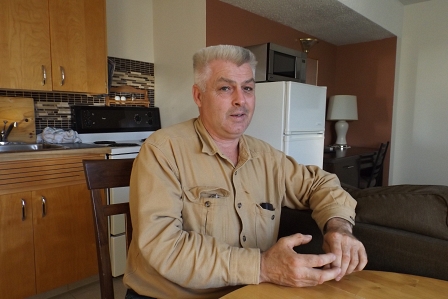
Kristaps John Balodis, the third
We have about fifty thousand beluga whales that are within the two hundred kilometre radius.
This isn't peak season, but there were still at least hundreds of them.
Well, that’s a seasonal transitional thing. But I don’t think any beluga whale wants to be caught in the sea ice.
They live fifty odd years. You’ve lived here your whole life, so you will have definitely seen some of the same ones over and over and over again, and presumably some of them will have seen you. Would you say that you’ve developed relationships of a sort with individuals?
There was a juvenile whale that was very mischievous, it had a black dot on its forehead. When you’re kayaking out there, it would just size you right up and take his tail and splash you and douse you with water. He would go to your rudder of your kayak and turn you 360 degrees and make people just squeal like little kids, you know, and he loved that. I can only imagine how he’s giggling to his buddies down under the water, you know…
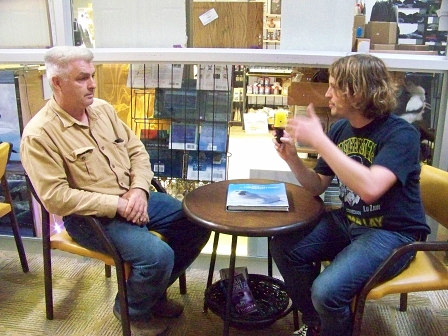
Johnny Bliss
Part Three: Three days, three polar bears
Admittedly, not having an armoured vehicle to hide in definitely reduced our appetite for close encounters of the bear kind. But, though none of us wanted to admit it, if we were to not see a single polar bear in Churchill (and we only had three days), we were all going to be really disappointed.
For me, there was extra pressure, because a couple years back, I'd went to Svalbard/Spitsbergen and not seen any polar bears. If I would go to Churchill too, and not see any, it would border on becoming my super power: I could go to places where there were definitely polar bears, and never see any of them. Next challenge would definitely be visiting a zoo's polar bear enclosure, and then if I saw one, I would have to be disappointed too, because it would mean I didn't have a super power at all.
Fortunately, as with the beluga whales, in Churchill it's more difficult to not see polar bears, than to see them, as we were quick to discover!

Kristaps John Balodis, the third
As I mentioned above, we'd met a friendly pair of fellow tourists from France, who'd convinced us to rent a car with them and join them in driving around the area. Less than an hour in, we'd stepped out of our rental vehicle at a picturesque point with a boardwalk, just out of town, a place called Cape Mary. The weather was nice over the rocks, the area was quiet, and little did we know, we were on a collision course with a polar bear, who was at that moment running very fast in nearly a straight line to where we were standing. I'll leave it up to Kristaps to pick up this story...
KRISTAPS: We were very cautious, there were four of us, everyone taking turns looking in each direction. And as we were getting in the truck, we noticed that there was a helicopter which had sort of stopped in-flight. There’s only really one good reason why that helicopter would be paused over land, and it was the local conservation officers! They were chasing the bear out of town, but the path that they ended up scaring the bear through went right through where we were standing not five minutes earlier! So it was very fortunate that we were out of the way, because, especially [with] a frightened bear, there’s not much in predicting what can happen.
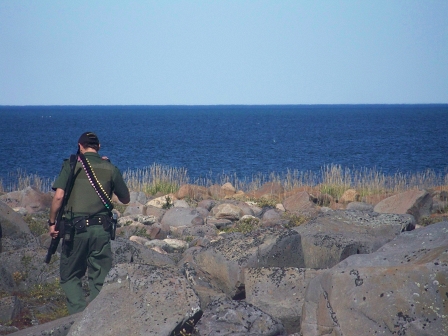
Johnny Bliss
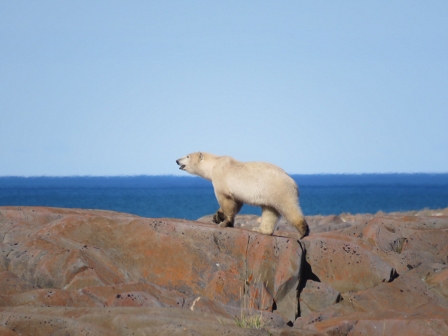
Kristaps John Balodis, the third
After the polar bear was successfully chased away, I approached one of these conservation officers - his name was Brett - and asked him for a quick interview about what had just happened, or almost happened.
BRETT: By helicopter, we were able to find the bear and we were hazing it away from the community when we came across yourselves and the vehicle. We have one vehicle that gets ahead of the bear, and finds if there’s anybody that we're chasing it into the path of. So I knew that you were there before you saw me.
Now, this is a bear that you recognized from before.
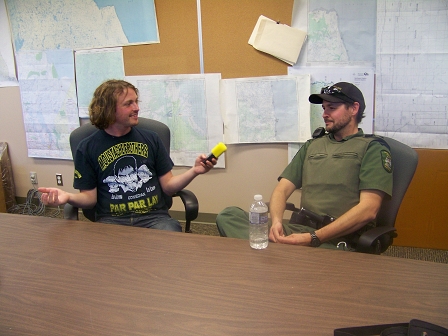
Kristaps John Balodis, the third
Yeah, that’s true. The on-call staff from last night had a call-out at 1:30 in the morning. They saw that same bear just inside town limits, and chased him out into the darkness and they lost him in the dark.
How did you know it was the same bear as last night?
Bears are distinguishable by their size and body condition - so if they’re a really fat bear, or a very thin bear, or a very dirty bear, or a very clean bear… Or sometimes you’ll have a bear with scars on its face or a distinctive mark… [Also] some of the bears - most of the bears - will learn these behaviours because of people, and also because of what they’ve learned from their mothers. So, for instance, if there’s a mother bear that has gotten [used to eating garbage] and it takes its cub to the garbage dump as well, now that cub has learned that behaviour, and it will take that throughout its whole life, because of that.
This is a strange place to build a town, when you think about it.
It is, yeah, right along the migratory path of the Western Hudson Bay polar bear population. It’s on the narrowest part of the peninsula, and any bears that’ll be traveling along the river, or the bay coast, will come in contact with town. What we want to prevent is bears finding garbage to eat, or becoming accustomed to being around people, and becoming… we call it human habituation, or food conditioning. The types of bears that we’ll capture and hold in the facility, because they pose more of a threat to the public than the bears that are afraid of people and don’t want anything to do with town, and they just want to be away. It’s the problem bears that come to town, we chase them away, they come back again numerous times. Those are the ones that we’ll capture and put in the holding facility.
Bear jail.
We call it a polar bear holding facility.
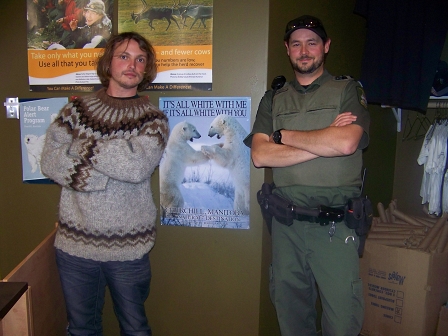
Johnny Bliss
Polar bears and beluga whales aren't the only spectacular part of a visit to Churchill... we also saw some really amazing northern lights, and saw them at the site of a plane wreck; listen to the audio for a proper explanation.
--
FM4 Reality Check Special on Saturday, January 21st
Listen to a Reality Check Special with Johnny Bliss visiting the arctic northern Canadian community of Churchill. Saturday, January 21st, 12-13, and afterwards seven days on demand.
If you miss the program, you can still stream it via the Reality Check podcast or at fm4.ORF.at/7tage.


